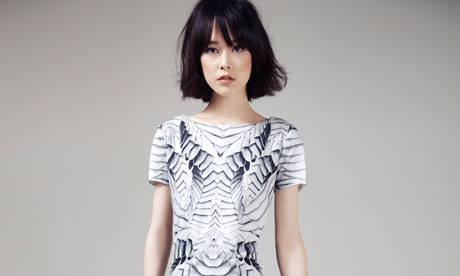
The size zero debate has raged for years, drawing in models, fashion designers and magazine editors, politicians and doctors – and it shows no sign of abating. In the last few weeks, River Island has been criticised for using an ultra-slim woman in its latest campaign, and the former editor of Australian Vogue has revealed that models are eating tissues to stay thin.
Now a controversial event at the London College of Fashion will propose a "revolution in how we think about body size".
On Tuesday, nine speakers will aim to bridge the gap between aspiration and reality in Be Real Talks: Why Size Doesn't Matter – "a cross between a theatre experience and a comedy club with a workshop element". Speakers will include psychologist Dr Linda Papadopoulos, who has spoken out against the airbrushing of photos and has advised the government on its negative impact, and Natasha Devon of Body Gossip, a not-for-profit organisation that aims to raise awareness about body image.
Devon says: "When you look at social media, there is a huge chorus of people who are fed up of the advertising and beauty industries. They want a revolution. The tide is turning."
In the last seven years she has lectured to more than 20,000 14-to-18-year-olds about body confidence: 30% boys and 70% girls. "Their idea of what is anatomically perfect is very narrow," she says. "It's basically Barbie and Ken. It's a huge job to get them to see that there is no such thing as perfect."
Liberal Democrat women's minister Jo Swinson is heading an all-party parliamentary group to develop a "national campaign for positive body image". Devon is petitioning the education secretary, Michael Gove, for more funding for PSHE (personal, social and health education), which has been in the national curriculum since 2000. She says she does most of her work with independent schools because state schools do not have the budget and anything touching on "body confidence" is expected to be covered by school teaching staff.
Hospital admissions in the UK for eating disorders rose by 16% last year, with children and young people accounting for most admissions.
Frustrated with a lack of organised change in the advertising and fashion industries and little movement on the subject from government, grassroots groups are trying to turn debate into action. This week Debra Bourne of All Walks Beyond the Catwalk, an organisation designed to promote diversity in the fashion industry, complained about the lack of regulation on digital retouching of photographs: "There's more regulation around advertising a refrigerator than a woman's body. You couldn't get away with selling some fancy Mercedes by retouching the headlights or streaming down the wheels, but you can do that to a woman's body."
In an America obsessed with size zero (equivalent to size 4 in the UK), new research suggests that 42% of the US population will be obese by 2030. There still seems to be huge confusion over whether celebrating and accepting larger sizes would make things better or worse. Why is the fetish for slim and beautiful only making us larger?
American chatshow host Ellen DeGeneres made headlines last week when she attacked clothing chain Abercrombie and Fitch for refusing to stock anything over a US size 10 (UK size 14).
"Since when was something over a size 10 'plus-size'?" she asked. "It's not just Abercrombie & Fitch: I've noticed the trend in women's clothing. It's getting ridiculous. Now they actually have a double zero. What are we aspiring to? 'Honey, do these jeans make my butt look invisible in this?' Beauty isn't between a size zero and a size eight; it is not a number at all, it is not physical."
Last month a former editor of Australian Vogue, Kirstie Clements, revealed that she knew of models who were eating tissues to stay "Paris thin". She said she had attended a shoot where a model didn't eat for three days. And in the UK there was criticism of a campaign for Georgia Hardinge's new collection at River Island, which showed a very slim model.
Comedian Deborah Frances-White is also speaking at the Be Real event, which is in aid of eating-disorder charity Beat. "While people's deaths are still linked to over-and under-eating in a society that is drowning in food and information about nutrition, it's pretty urgent we get our heads around this issue," she says.
"We see thousands of images of clever, powerful, ambitious, opinionated men every week. We see thousands of images of underweight women with symmetrical faces. If you're a media consumer, the message is clear. Looks are highly important and there are two looks that are acceptable – Jennifer Aniston and Jennifer Lopez. Do you look like either of those women? If not, ABC – Always Be Changing."
But isn't holding your revolution at the London College of Fashion a bit like holding a vote for Christmas in a turkey coop? Frances-White says: "Let's not hold it at the Hegemony Wing of the Institute for Feminism and Her-story Studies. The members of the choir have preached to each other for long enough. If it's going to be a debate, let's have it somewhere dangerous, somewhere where feelings might be hurt as well as ideas exchanged – somewhere where change might actually happen."
Be Real Talks: Why Size Doesn't Matter, London College of Fashion, Tuesday 4 June, 7pm

